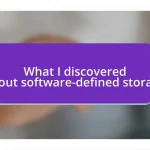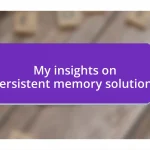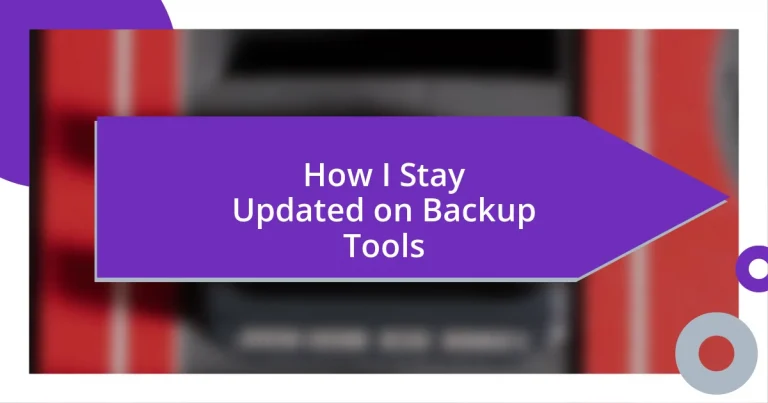Key takeaways:
- Backup tools are essential for data protection, enhancing creativity and productivity by providing a safety net against potential loss.
- Staying updated on backup tools involves identifying reliable information sources, engaging in online communities, and following industry leaders for insights and trends.
- Evaluating tools through user reviews is crucial for making informed decisions, offering insights into real-world performance and community engagement that marketing materials may overlook.
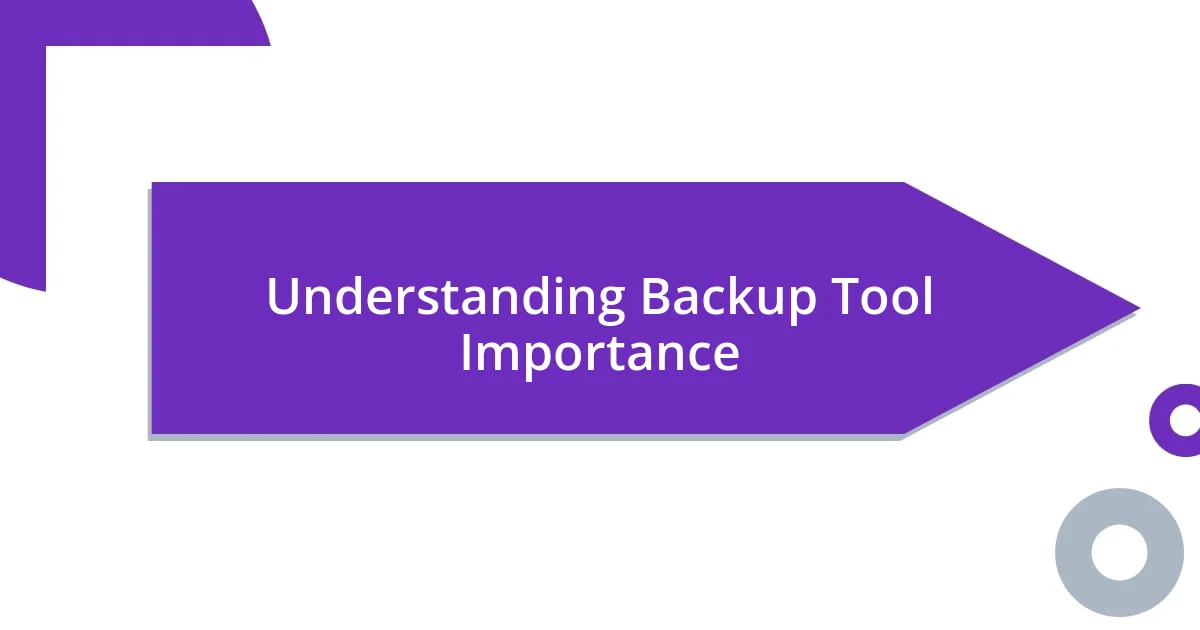
Understanding Backup Tool Importance
Backup tools are essential because they protect the fruits of our labor. I remember a time when I lost weeks of work due to a sudden hard drive failure. It was devastating. That experience taught me the hard way how crucial it is to have reliable backup solutions in place.
Every time I hear someone say, “It won’t happen to me,” I feel a mix of skepticism and concern. The reality is that data loss can occur in countless ways, from hardware failures to accidental deletions or cyberattacks. Knowing that I have a backup tool in place gives me a sense of security, almost like a safety net. Isn’t it comforting to think that even if something goes wrong, you won’t be starting from scratch?
Moreover, backup tools are not just about safeguarding data; they also empower creativity and innovation. When I know my work is backed up, I can freely explore new ideas without the nagging fear of losing everything. It’s a liberating feeling, one that enhances productivity and inspires me to push boundaries. Have you ever found yourself hesitating to try something new because you were afraid of losing your hard work? Imagine how you could unleash your creativity with the right backup tools!
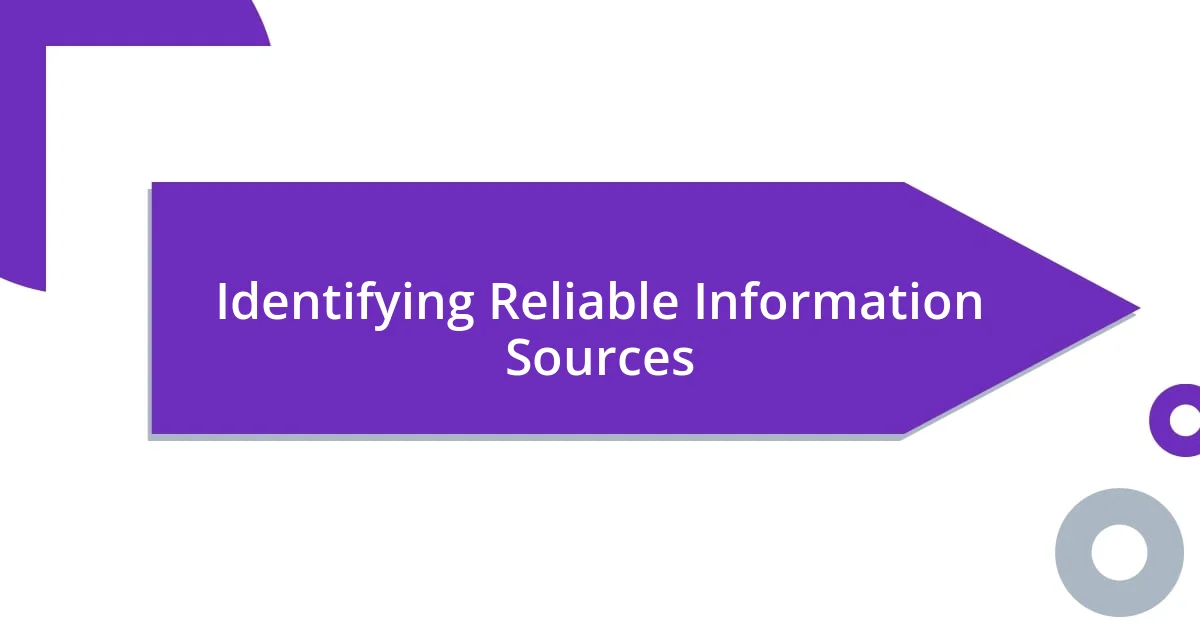
Identifying Reliable Information Sources
Identifying reliable information sources is crucial in navigating the ever-evolving landscape of backup tools. I look for indicators of credibility, such as the expertise of the author or organization behind the content. For me, established tech websites or industry forums often provide valuable insights. I’ve often found myself scouring articles, noting the publication date to ensure the information is current. It’s surprising how quickly things can change in technology, and outdated advice can lead you astray.
When assessing sources, I consider several key factors:
- Author Credentials: Are they professionals in tech or data management?
- Peer Reviews: Has the information been vetted by experts in the field?
- Publication Date: Is it recent enough to reflect current best practices?
- User Experiences: What do other users say about the tools?
- Citations: Does the source reference reliable studies or widely accepted practices?
I find that trusting my instincts plays a role, too. If something doesn’t feel right or seems overly promotional, I dig deeper. That skepticism has saved me from adopting tools that turned out to be subpar, highlighting the importance of discernment in my research.
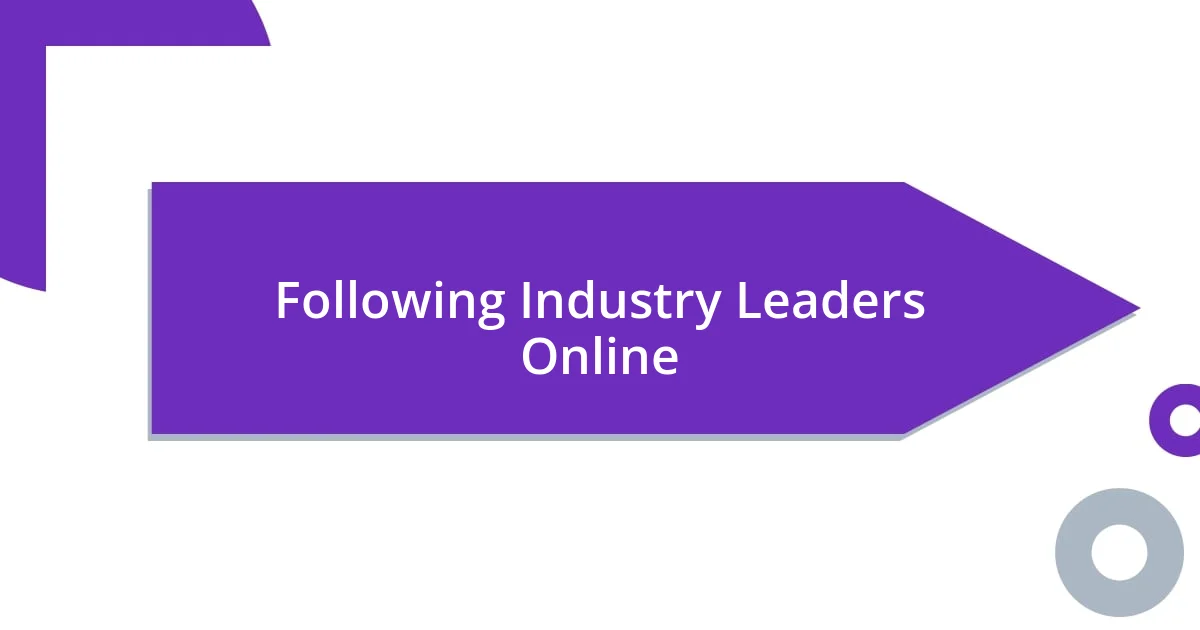
Following Industry Leaders Online
Following industry leaders online has been instrumental in my quest to stay updated on backup tools. I follow influential figures on platforms like Twitter and LinkedIn, where they frequently share trends and insights. For instance, last year, I came across a tweet from a renowned data recovery specialist who highlighted a lesser-known backup tool that ended up being a game-changer for my workflow. It’s amazing how a single post can introduce you to powerful resources that might otherwise fly under the radar.
I also engage actively in online communities where industry leaders often participate. These platforms, like Reddit and specialized tech forums, are goldmines for real-time discussions. I vividly recall a thread where a developer openly discussed the pros and cons of different backup solutions. His candor and expertise made me reconsider my own choices, and I ended up experimenting with a new tool that has since improved my backup strategy significantly. Has anyone else found community discussions to be enlightening?
In addition, I subscribe to newsletters and podcasts featuring interviews with backup industry experts. These formats not only allow me to digest information on the go but also provide a personal touch as I hear stories and advice straight from the pros. I remember listening to a podcast episode where a cybersecurity expert candidly shared their experience with data breaches and the critical role of backup tools in recovery. Their compelling narrative underscored just how important it is to remain vigilant and well-informed.
| Platform | Benefits |
|---|---|
| Real-time updates and conversations | |
| Professional insights and industry news | |
| Community-driven discussions and honest reviews | |
| Podcasts | Engaging stories and expert advice |
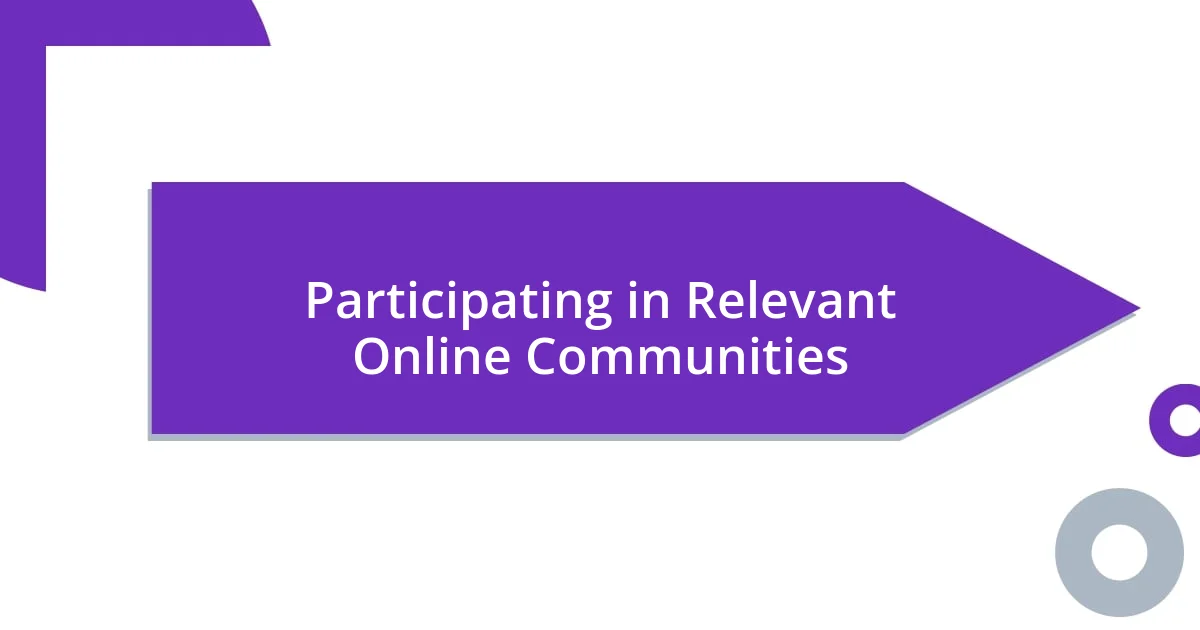
Participating in Relevant Online Communities
Being part of relevant online communities has been a game-changer for my understanding of backup tools. I remember joining a specific tech forum focused on data management. Within just a week, I encountered a discussion where users shared their first-hand experiences with various tools, including one I had considered but ultimately held back on. Hearing real-life stories from users not only provided valuable insights but also built my confidence in making a decision that previously felt daunting.
I also find that engaging in these communities allows for a vibrant exchange of ideas. Just the other day, I participated in a Reddit thread where members debated the merits of certain cloud backup solutions. Someone mentioned a feature I had overlooked during my research. It got me thinking: how often do we miss crucial details when we rely solely on promotional content? The collective wisdom of these discussions helps to fill those gaps, offering perspectives I might not have considered on my own.
Moreover, the sense of camaraderie within these groups is refreshing and motivational. There’s something reassuring about knowing others are just as invested in finding the best tools. I often leave these interactions feeling inspired and equipped with fresh ideas. Isn’t it fascinating how a mere exchange of thoughts can reinforce your commitment to improving your backup strategy? Engaging in these communities not only keeps me updated but also fosters a sense of belonging.
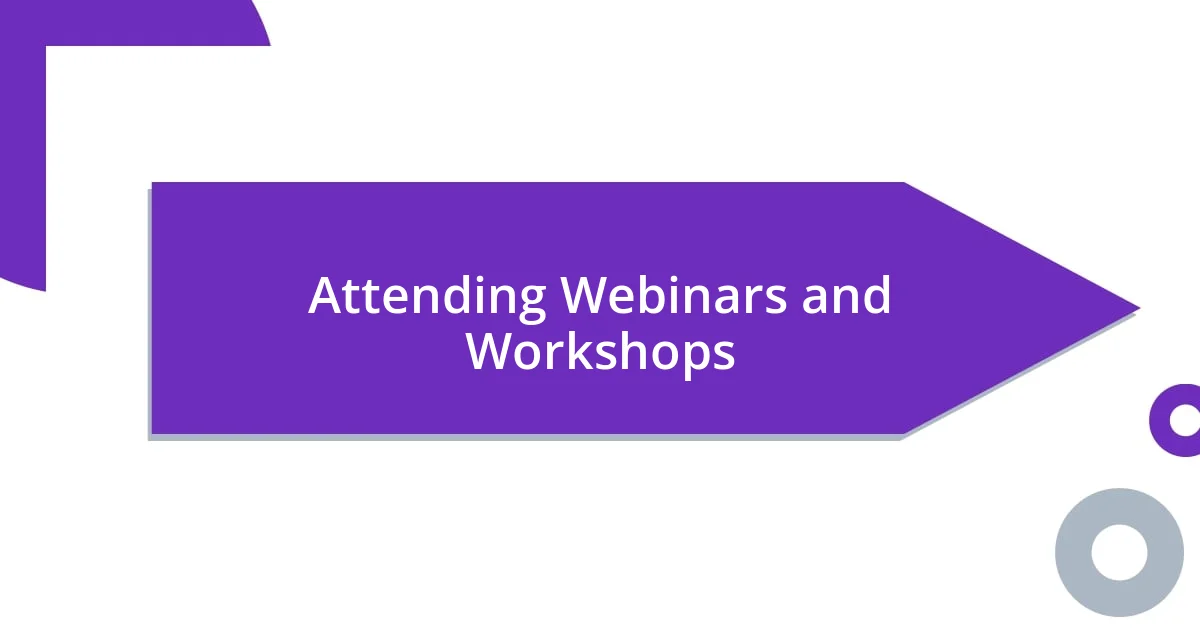
Attending Webinars and Workshops
Attending webinars and workshops has become one of my favorite ways to keep my knowledge about backup tools fresh. Just last month, I attended a workshop focused on cloud storage solutions, and it turned out to be wildly informative. The speaker was a leading expert who not only presented new tools but also shared case studies that highlighted real-world applications. It’s inspiring to see how these tools can transform workflows and ensure data security.
I recall participating in a live Q&A session during one of these webinars where I had the chance to ask my burning questions. The facilitator, with years of experience, provided insights that simply aren’t found on blogs or in videos. For example, they discussed a specific backup tool’s limitations that I wasn’t aware of and offered alternative recommendations. Have you ever attended a session where you left feeling more knowledgeable than ever? I certainly did, as it underscored the importance of getting information directly from industry professionals who have hands-on experience.
Moreover, the interactive nature of these events adds an exciting layer to learning. Networking with other attendees can spark new ideas and collaborations. After one workshop, I connected with a fellow participant who turned out to be using the same backup tool I was struggling with. We exchanged tips and tricks that I hadn’t even considered before. Who knew that a straightforward conversation could lead to practical enhancements in how I manage my backups? This dynamic exchange fuels my passion for continuous improvement and thrives in the context of shared knowledge.
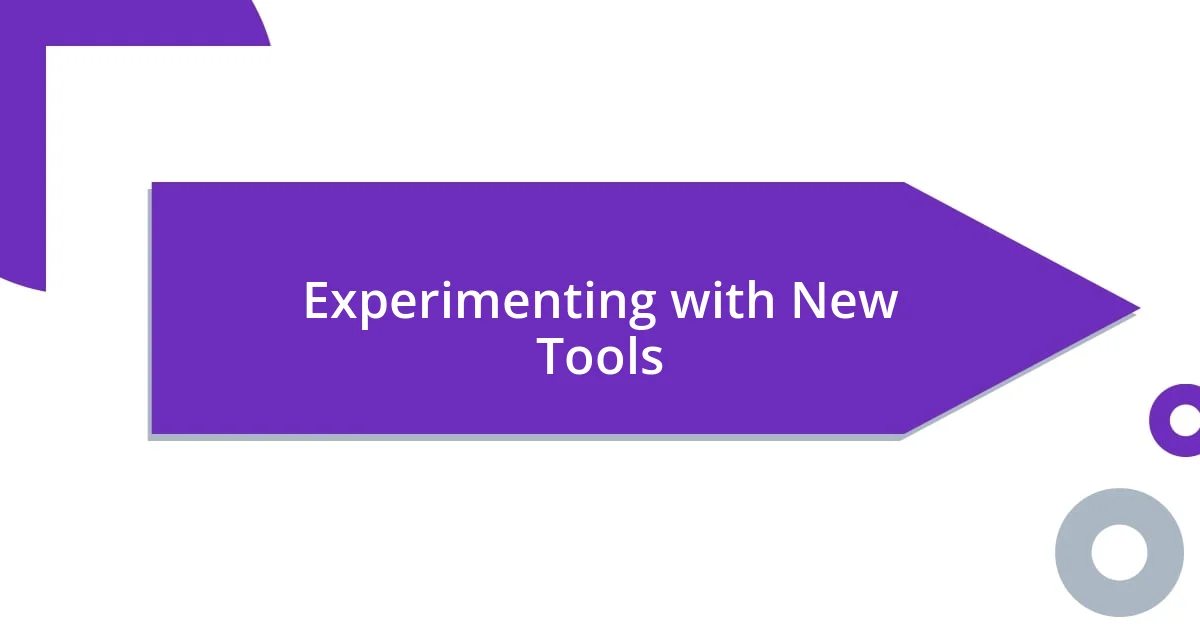
Experimenting with New Tools
Experimenting with new tools is one of the most exciting aspects of staying updated in the backup technology space. I vividly remember downloading a trial version of a relatively unknown backup tool out of sheer curiosity. Within hours, I was amazed at how intuitive it felt, but the real eye-opener was discovering a unique feature that automated backup scheduling in a way I had never experienced before. Isn’t it thrilling when you stumble upon something unexpectedly beneficial that elevates your workflow?
I often set aside dedicated time each month to explore different tools, and it’s turned into a bit of a personal ritual for me. Just last week, I discovered a tool that integrated seamlessly with our existing software, which was a pleasant surprise! Trying out these tools in a low-stakes environment allows me to familiarize myself without the pressure of making immediate decisions. Have you ever felt the thrill of finding the perfect solution during a trial run? It’s moments like these that motivate me to keep exploring.
What’s particularly rewarding is sharing my findings with colleagues afterward. I can’t count the number of times I’ve brought a new tool to the team’s attention, sparking conversations and encouraging others to test it out. One of my favorite experiences involved presenting a promising backup solution that everyone now swears by. I often wonder: how many hidden gems are just waiting to be discovered by taking that leap into experimentation? Staying open to new tools not only enhances my knowledge but also enriches our collaborative environment.
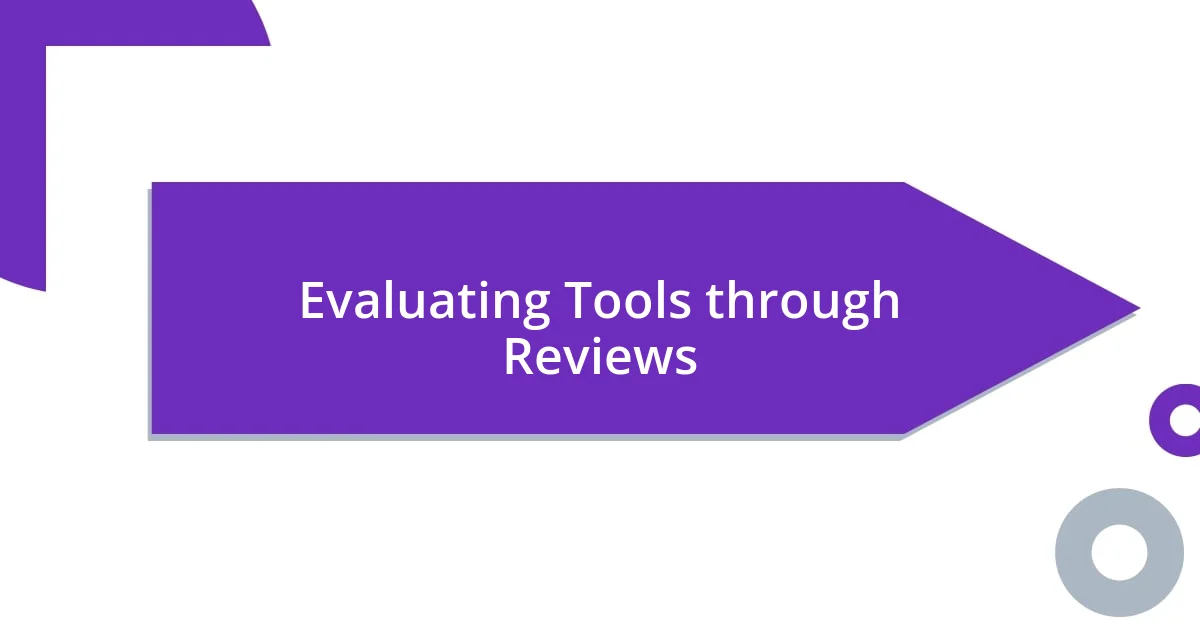
Evaluating Tools through Reviews
Evaluating tools through reviews is a critical component of my decision-making process. I remember scrolling through user feedback on a backup solution I was considering. Some reviews were glowing, while others raised legitimate concerns about customer support. It’s fascinating how real users’ experiences can shed light on aspects that marketing materials often gloss over, right?
When I read reviews, I look for patterns that reflect common issues or standout features. For instance, during my most recent tool evaluation, several reviewers highlighted the tool’s impressive speed but pointed out that its interface could be daunting for newcomers. This insight made a lasting impression on me; I knew I would need to factor in user-friendliness before recommending it to my less tech-savvy colleagues. Have you encountered a tool that seemed perfect on paper but fell short due to usability? I’ve been there, and it can be frustrating!
Ultimately, diving into reviews isn’t just about gathering facts; it’s about understanding the broader community sentiment. After one of my reviews caught the attention of the product team, they reached out to share updates based on user feedback. That sense of connection was exciting—it reminded me that my voice mattered in shaping the evolution of these tools. Engaging with reviews not only helps me make informed choices but also connects me with a vibrant community of users who share my passion for efficiency and reliability in backup solutions.


